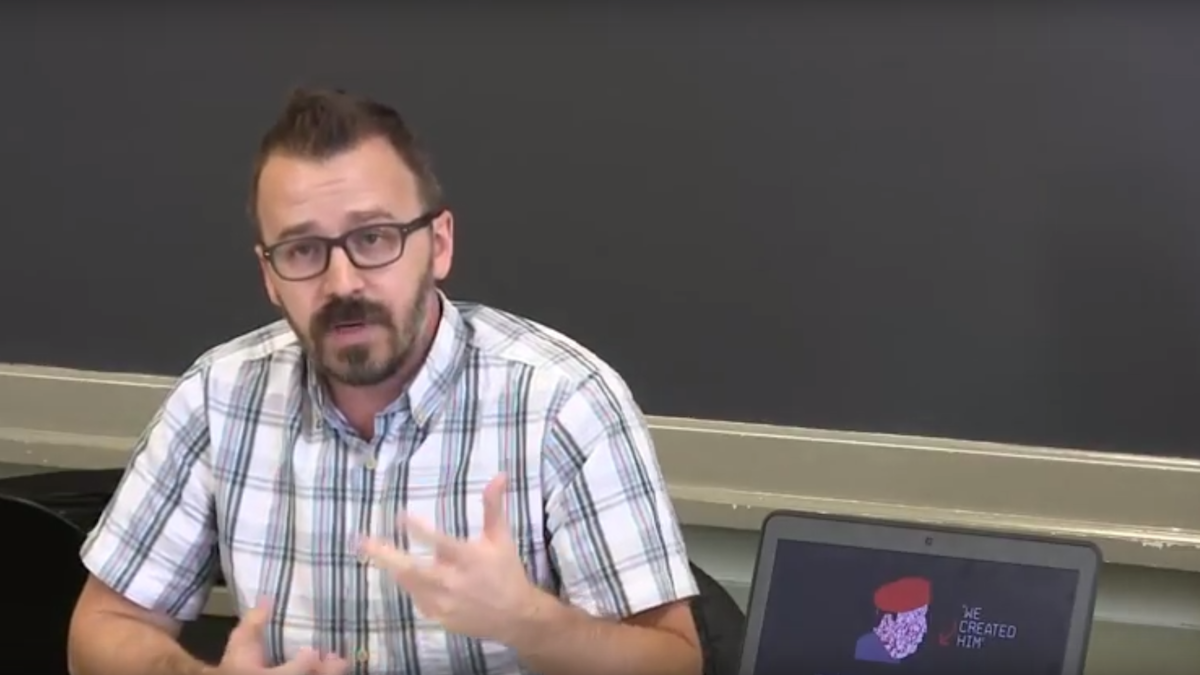The Drexel tweet storm and America’s ugly political atmosphere

Drexel professor George Ciccariello-Maher (image via youtube)
Let’s get a few things straight from the start. Drexel University professor George Ciccariello-Maher had every right to tweet out his tongue-in-cheek salute to “white genocide” on Christmas Eve. And Drexel was wrong to condemn him in a press release the next morning, which ignored the obvious satire of his remark.
But Ciccariello-Maher was wrong, too, to link his critics to genocide. That simply feeds the polarized, take-no-prisoners spirit of our contemporary political moment. Even if you support the professor’s freedom of speech and his fight against racism, like I do, you shouldn’t be shy about calling out his feckless rhetoric.
For those of you who were wrapping presents instead of monitoring your cellphones, Ciccariello-Maher tweeted “All I Want for Christmas is White Genocide” on Dec. 24. The tweet borrowed a favorite term of white nationalists and other racists, who have warned that immigration, interracial marriage, and unchecked population growth are eroding Anglo-Saxon power and identity.
It’s really just an update on eugenics, the pseudo-science that dominated American racial thought a century ago. But whereas eugenics was embraced by Theodore Roosevelt, Margaret Sanger, and other progressives of that era, today’s adherents of “white genocide” are marginalized into the darker corners of the alt-right.
Only someone who hadn’t done their homework — or was looking to score cheap political points — could possibly imagine that Ciccariello-Maher was embracing the theory of white genocide or the mass killing of white people. A very quick Internet search would have confirmed that he’s a longtime anti-racist activist. But that didn’t stop Breitbart and other right-wing websites from claiming that Ciccariello-Maher actually favored genocide.
Even worse, perhaps, his own institution implied the same thing. “Professor Ciccariello-Maher’s comments are utterly reprehensible, deeply disturbing, and do not in any way reflect the values of the University,” Drexel’s Christmas Day statement declared.
The statement reminds us yet again why university officials should not be in the business of passing judgment on what professors — or students — have to say. Although the university included a tepid endorsement of its faculty’s right to “freely express their thoughts and opinions,” its statement pointed in exactly the opposite direction: You work for us, and we will police your speech.
But in his posted reply to his critics, Ciccariello-Maher suggested that they were pro-genocide. “I teach regularly on the history of genocidal practices like colonialism and slavery — genocides carried out by the very same kind of violent racists who are smearing me today,” he wrote.
Got that? If you dislike the tweet about genocide by George Cicccariello-Maher, it must be because you harbor some kind of racist or even genocidal impulses yourself. Surely some of his critics are “violent racists,” including those who have allegedly sent him death threats. But all of them? Really?
Accusing your opponents of racism and genocide is the lowest trick in the political playbook, and it’s deeply bipartisan. Consider the notorious remark by David Friedman, Donald Trump’s nominee to be the next U.S. ambassador to Israel, who compared the American Jewish pro-peace organization J Street to Jewish kapos who collaborated with Nazis in concentration camps.
You don’t have to like everything J Street says — and I certainly don’t — to be outraged by this comparison. Like Ciccariello-Maher’s remark, it imagines that every foe is a kind of monster who lives beyond the moral pale.
That’s the height of cynicism, and it makes civil conversation impossible. Witness the fate of Andi Moritz, a freshman at Bryn Mawr College who posted a request on the school’s ride-share page looking for someone to take her to a Trump campaign event.
Moritz was attacked by dozens of students over social media, who accused her of — you guessed it — racist sentiments. “Nobody has a right to an opinion of bigotry,” one student wrote. “Why y’all doing this free labor for white supremacists,” another asked.
Moritz called Bryn Mawr’s suicide hotline and later decided to drop out of school, fearing for her physical and emotional safety. And that should remind us how dangerous it is to play fast-and-loose with charges of bigotry, which can sting as much as racism does.
Most of all, it should warn us against the tendency to vilify our opponents, which is the worst plague on the political land right now. In his reply to the Twitter storm, George Cicccariello-Maher claimed that “free expression and academic debate” are under threat from “the racist mob.” But the threats come from every corner, including his own. And we all need to own up to that.
—
Jonathan Zimmerman teaches education and history at the University of Pennsylvania. He is the author of “Campus Politics: What Everyone Needs to Know” (Oxford University Press)
WHYY is your source for fact-based, in-depth journalism and information. As a nonprofit organization, we rely on financial support from readers like you. Please give today.



